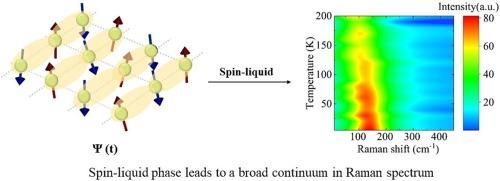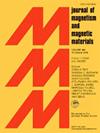Signatures of spin-liquid-like state and spin-phonon coupling in square lattice Sr2CuTe0.5W0.5O6
IF 2.5
3区 材料科学
Q3 MATERIALS SCIENCE, MULTIDISCIPLINARY
引用次数: 0
Abstract
A spin-liquid state can be induced by uncompensated interactions in the spin lattice due to disorder or randomness in exchange pathways. Sr2CuTeO6 and Sr2CuWO6 are square-lattice antiferromagnetic double perovskites (A2BB′O6) with dominant nearest-neighbor (Néel-type) and next-nearest neighbor (Columnar-type) magnetic interactions, respectively. Random distribution of these interactions in a system has been theoretically predicted to be a way to induce the spin-liquid state. Here, we have synthesized a spin-liquid candidate Sr2CuTe0.5W0.5O6 with B′-site mixing of its parent systems (Sr2CuTeO6 and Sr2CuWO6) to explore the phonon properties and their correlations with the liquid-like magnetic interactions. Our measurements reveal the presence of a broad continuum in the Raman spectrum of Sr2CuTe0.5W0.5O6, instead of the well-defined spin-wave excitations (magnon) observed in the parent systems. Observation of continuum feature in the Raman spectrum in conjunction with the lack of long-range magnetic order provide the signatures of liquid-like correlations. On the other hand, phonon anomalies are observed below the short-ranged magnetic ordering temperature indicating the onset of spin-phonon coupling.

方晶格 Sr2CuTe0.5W0.5O6 中的类自旋液态和自旋声子耦合特征
由于交换途径的无序性或随机性,自旋晶格中未补偿的相互作用会诱发自旋液态。Sr2CuTeO6 和 Sr2CuWO6 是方晶格反铁磁双包晶石(A2BB′O6),分别具有主要的近邻(奈尔型)和近邻(柱状型)磁相互作用。根据理论预测,这些相互作用在系统中的随机分布是诱导自旋液态的一种方法。在这里,我们合成了一种自旋液态候选物质 Sr2CuTe0.5W0.5O6,并将其母体系(Sr2CuTeO6 和 Sr2CuWO6)的 B′位混合,以探索声子特性及其与液态磁相互作用的相关性。我们的测量结果表明,Sr2CuTe0.5W0.5O6 的拉曼光谱中存在一个宽广的连续波,而不是在母体系中观察到的定义明确的自旋波激发(磁子)。在拉曼光谱中观察到的连续波特征以及长程磁序的缺乏提供了液态相关性的特征。另一方面,在短程磁有序温度以下观察到声子异常,这表明自旋-声子耦合的开始。
本文章由计算机程序翻译,如有差异,请以英文原文为准。
求助全文
约1分钟内获得全文
求助全文
来源期刊

Journal of Magnetism and Magnetic Materials
物理-材料科学:综合
CiteScore
5.30
自引率
11.10%
发文量
1149
审稿时长
59 days
期刊介绍:
The Journal of Magnetism and Magnetic Materials provides an important forum for the disclosure and discussion of original contributions covering the whole spectrum of topics, from basic magnetism to the technology and applications of magnetic materials. The journal encourages greater interaction between the basic and applied sub-disciplines of magnetism with comprehensive review articles, in addition to full-length contributions. In addition, other categories of contributions are welcome, including Critical Focused issues, Current Perspectives and Outreach to the General Public.
Main Categories:
Full-length articles:
Technically original research documents that report results of value to the communities that comprise the journal audience. The link between chemical, structural and microstructural properties on the one hand and magnetic properties on the other hand are encouraged.
In addition to general topics covering all areas of magnetism and magnetic materials, the full-length articles also include three sub-sections, focusing on Nanomagnetism, Spintronics and Applications.
The sub-section on Nanomagnetism contains articles on magnetic nanoparticles, nanowires, thin films, 2D materials and other nanoscale magnetic materials and their applications.
The sub-section on Spintronics contains articles on magnetoresistance, magnetoimpedance, magneto-optical phenomena, Micro-Electro-Mechanical Systems (MEMS), and other topics related to spin current control and magneto-transport phenomena. The sub-section on Applications display papers that focus on applications of magnetic materials. The applications need to show a connection to magnetism.
Review articles:
Review articles organize, clarify, and summarize existing major works in the areas covered by the Journal and provide comprehensive citations to the full spectrum of relevant literature.
 求助内容:
求助内容: 应助结果提醒方式:
应助结果提醒方式:


